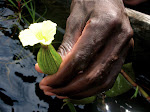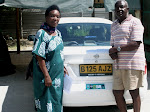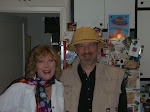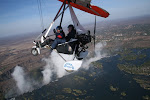July 26, 2008
Maun, Botswana
Before I came to Botswana I heard the rumors and fielded the questions: She’s moving to Africa?! She must have fallen in love with a man while on vacation. Why else would she pack up and leave everything – her normal life-- for a year? It HAS to be a man.
It’s true that I fell helplessly head over heels in the way I have done in the past for a man, but this time the heartthrob that left me breathless was a country. When I was standing out in the wilderness marveling at the sunset last July, my heart felt truly at home and as full as at any time I was falling off the familiar cliff for a man. Maybe fuller.
My many blog entries confirm how I came here to Botswana wearing sparkling, rose-colored glasses. I was crazy in love with a place. I also knew, much as I hated to entertain the thought, to prepare myself, for my idealized view would not turn out to be the whole picture and my affection would most likely be tested in some way.
This was the week.
I am writing about this because I find writing helps me to sort out my feelings and think through knotty problems. As one of my writer friends says, I’m not sure what I think of something until I write my way through it.
My last blog entry talked about how I was rushing off to the bush again, this time to fill in for an assistant lodge manager needing to return to his village for his sister’s funeral. I was sad that there was yet another young person’s funeral in Botswana (the numbers are astounding) but selfishly grateful to receive the request for my return to Savute Marsh, just outside Chobe National Park. I could see the elephants again and hear the lions and, with any luck, see my first cheetah in the wild.
The remote bush is magic. Sit and look in one direction for a few minutes. You will be amazed at the show changing before your eyes: Elephants silently come out of nowhere to drink water. A martial eagle flies in. A family of warthogs trots by. Over there, in the thorn-bush, the leader of a group of impala peeks through to see if the coast is clear to the water hole. A little elephant shows up, a deformed misfit -- he has a conical stump where his trunk should be -- but he manages, with his right back leg stretched straight out behind him, to tip himself forward, as if in elephant yoga pose, and with unspeakable grace he sips from the water hole. Later the wild dogs might circle. I will never tire of the view.
The plan was for me to fly in on July 15 and stay until Sunday or Monday. That would have me back in time to work on solving my transportation challenge and to prepare for my volunteer work set to begin on July 23 at Bana Ba Letsatsi, a Maun nonprofit that cares for at-risk children.
As it happened I was in the dark about my departure time. Our radio communications went out at the lodge, and I wasn’t getting any information about when I might leave. By Monday I was worried about when I would ever be back in Maun. Word finally came that afternoon that I would fly out on Tuesday.
And so this week, on Tuesday, I flew back to Maun, where I was met at the airport by Desert and Delta’s head of HR, Adrienne, who has gone out of her way to welcome me and help at every turn of my journey to Botswana. She lugs my bags. She gives me “mystery guest” assignments. She checks in with me by SMS to let me know she and her husband are there if I need anything.
This time she met me with bad news: On Monday night there was an intrusion on the property where I live and it was terrible. She offered to put me up in town for the night. But I said no. I wanted to go there and find out for myself.
The taxi ride on the sandy road to my house was interminable. Would my place be ransacked? Would my laptop be gone? How bad was it? I was supposed to have been sleeping there Monday night if not for the delay in my departure. What might I have faced alone in that cottage?
The local Maun newspaper, which got many of the facts wrong in the news story, got some of them right in its editorial yesterday, “The incident this week which resulted in a resident and his wife being stabbed when assaulted in their home has sent shockwaves through the community….”
I found my little cottage untouched by the violence. But next door, a few yards away in our fenced compound, I found Stuart with his face and eyes swollen and gauze wrapped around his head. His wife, Kim, had bruises on her head and a small but fat bandage on her back, behind her arm. Their 10-year-old son, my buddy who gives me survival tips for the bush, was physically unharmed but exhausted.
This is how the attack was described to me, in hurried and piecemeal terms, and I write this admittedly without my having had the courage I have in my professional life to go back and double-check every last detail before publishing. I am too heartbroken for my neighbors’ plight to ask again:
Kirk, an architect and one of the owners of the safari company who lives in an apartment in our compound, had been sitting in the living room of my and his landlords’ house, the green, thatched-roof house that I have described as having a storybook quality. He left just after 9 p.m. to go to the River Lodge for a drink.
Not 15 minutes later two men barreled through the door of the green house. Stuart was sitting on the couch doing work on his laptop. One of the assailants attacked him with a metal bar, likely a crowbar. He was knocked out, and he crashed through the glass coffee table. Blood was everywhere. They went after Kim and knocked her down. They left for a minute or two and returned. The smaller one zeroed in on Kim, now in the bedroom. He pushed at the bedroom door, trying to get to her and the boy. Kim struggled to push the door closed. They went back and forth like this until the man managed to squeeze his arm through the opening and began stabbing her.
The little boy was yelling at him to get out. But the knife worked. The attacker pushed his way into the bedroom and beat Kim some more when she lay crumpled on the ground. The little boy was brilliant, clever beyond words. He managed to slip past and out the bedroom door. He grabbed the 911 radio from the floor where it had fallen and rushed into the dark. He hid in the darkest spot he could find on the property and radioed for help. All over Maun this week people have been talking about the chilling call from the child, and I cried when I heard him tell me what he had done. How brave he was.
The 911-radio system is bush-style vigilance in a town that hasn’t yet earned the designation of being called a town by the Botswana government. Maun is still considered a village, a frontier-like settlement growing fast, where crime is on the increase and the police haven’t been able to cope. Most tourists never even see Maun. They fly into the airport on Air Botswana from Johannesburg and out by bush plane a few minutes later into the pristine world of the Okavango Delta or the savanna of Chobe National Park.
In Maun the citizens have stepped into the law enforcement void with a take-no-prisoners attitude. One woman who has seen the 911 response in action described it to me as a scene out of the movie “Mad Max.” As soon as a call comes in, residents from every corner of Maun in the network respond. They roar to the scene in their 4X4s and aboard ATVs, some with guns slung over their backs, some with sticks in hand and with their spotlights scanning for the intruders.
At the property where I live it’s estimated that they began arriving within about 3 minutes of the little boy’s call. The quick response has been a true comfort to those who live on this property.
You pay for a radio and an annual membership in the network, and in return you are expected to respond in whatever capacity you can to emergency calls. The head of the network is Sharif (I’m not sure of the spelling). He is a Muslim family man, a local businessman and a renowned tracker of criminals. The only thing that stops his pursuit is prayer time, when he unfolds his rug, falls to his knees and prays to Allah. He showed up at this property and tracked through the night. So did the police. They followed the criminals’ footprints in the sand in the way guides track the lions.
By 8 a.m. Tuesday, the police had caught the suspects, who I am told have confessed and have led police to the stolen money and items taken from the green house. The police performed so admirably that Stuart has written the head of law enforcement for all of Botswana to commend them.
Standing inside the green house as Kim was telling me the story, I looked at her and couldn’t stop my tears when I imagined what her family had been through. And I told her how before I left for the bush I had seen a man walking near our fence line. It was daytime. I was standing in my cottage, its sliding glass door open, and I was sweeping the dust and pellets from the so-called “tree squirrels” from my place. The man stared in at me. He gave me the creeps. He wasn’t like men in Botswana. There had been no greeting of hello and a wave. I had a bad feeling. I watched him as he walked and he kept turning back to look behind him. I remember thinking I need to remember this guy should anything bad happen. Later that day I asked Kirk whether I should be concerned about what I had seen. He said no, a lot of neighbors walk by the fence to go down to the river to fish. That guy was probably one of the neighbors, he said. I wasn’t so sure.
On Tuesday afternoon, Kim looked surprised when I told her the story.
“Can you describe him?”
I said I couldn’t really describe his face, but he had been wearing a striped shirt. Her eyes widened. Striped, how?
I told her horizontal. Blue and White.
“Dark or light?”
I wanted to say dark. I knew it wasn’t baby blue. I knew it was a rugby-style shirt.
A few minutes later, Kim had me peek out the window, from behind the curtain. The police were putting the suspects in the truck after having made them retrace their steps to find the goods. I couldn’t see the bigger one, the one called the more “vicious” of the two. But the “weaker” one, the one who had stabbed Kim, was wearing the rugby shirt I had described. The guy must have been casing the property the day I saw him walk the fence line.
As I write on this Saturday morning, men are outside hammering. Stuart has ordered a replacement fence to be built, a taller one far different from the chain-link model currently in place. Our bush view will soon be gone. New bolts are on my doors. We have security at night making the rounds. Beside my bed is a can of “Gettem,” a ridiculous-sounding name for Mace. I sleep with my cellphone under the pillow beside me with the number on the screen for one of the men I know who will respond in an emergency. For several nights it was the number for Bernie, Adrienne’s husband. Last night it was Kirk’s. A businesswoman in town called to check on me and said I must buy a 911 radio (or she would buy it for me), but I opted not to after Adrienne said it would frighten me more to hear it; a cellphone was fine. I opted as well not to buy the “taser” stick the woman recommended.
The newspaper editorial yesterday closed with, “The police in Maun cannot be blamed for an inability to stop crime in its entirety. The force is understaffed and there are not enough vehicles. Patrols mounted by the police and special constables, and on occasion by the security forces, are mounted day and night but the deviousness of the criminal element must be recognized. The community is urged to take all reasonable precautions for protection purposes.”
Which is a little like an editorial extolling to students the benefits of completing their homework.
What does one do when a love affair takes a turn?
I am watching. I am listening. I am sleeping, sometimes with one eye open. I recall how I lived for 3 months in the bush with my laptop and digital camera in full view and my wallet with its passport in my backpack on the floor. The lodge managers have no safes in their rooms and in most cases no locks on their doors. Except for the first day, I never worried for a moment about my safety or my belongings’ safety in my tent or house. Even with wild animals pacing at night, the remote bush, it seems to me now, is far safer than civilization.
In the outskirts of Maun where I live, the doves made their morning calls as usual today. The winter sky dawned its constant blue. My big plan for the day is a trip into Maun to buy groceries so I can cook spaghetti tonight for all of us who live on the property.
I am convinced that Africa has more to teach me, not just about light so bright one must don rose-colored glasses to withstand the splendor but about the shadow side of life that all of us would prefer to ignore, no matter where we live. For now I am staying. But I am not as giddily happy or as carefree as I was a week ago. And it brings to mind a common expression among Africans I have met, black and white; their quiet response to anything that demands sympathy or a signal of human connection in times of trouble: “Shame. Ah, shame.”
Subscribe to:
Post Comments (Atom)
A magical flower

The guide squeezes this flower and it squirts water like a water pistol
Cathy and Joe Wanzala

They couldn't wait to paste the Obama sticker on their car
My main man

Ernest is my trusty cab driver who blasts music as we make our way through Gabs
Ted Thomas, man of intrigue and style

My friend, Ted, and his wife, Mary Ann, hosted a Safari Send-Off for me in Austin and treated me to a special mix of African music that already a UB student and a professor want to download.

4 comments:
Wow, Maria. We got the basic details of the attack from Mary Ann. But this telling is something else. The Wild West......Makes the wildlife look fairly tame.
I think you are no longer a tourist. Congrats!!!
Maria, this is quite an entry. I'm finally catching up. Hang in there, girl! You're a smart traveler and you're learning more from this. We all love and miss you and can't wait to hear you tell this tale in person. -Jena
Maria- it sounds to me like Africa is giving you everything you wanted. I know that this is more than a pleasure trip- it's a spiritual journey. If we learn nothing in our search for TRUTH, we learn that there is no light without the dark, and therefore both are of value.
You got it right- acceptance.
We cannot sustain any one emotion- even if it's joy. Grief and fear are just as enervating as joy- and have as much or more to teach us.
I miss you!
Kathy
Maria -- I just read your entry. I am so glad you are safe. Needless to say -- I understand in my own way as I am on a similar journey. You, my friend, are having a revolution instead of an evolution. -- Thais
Post a Comment